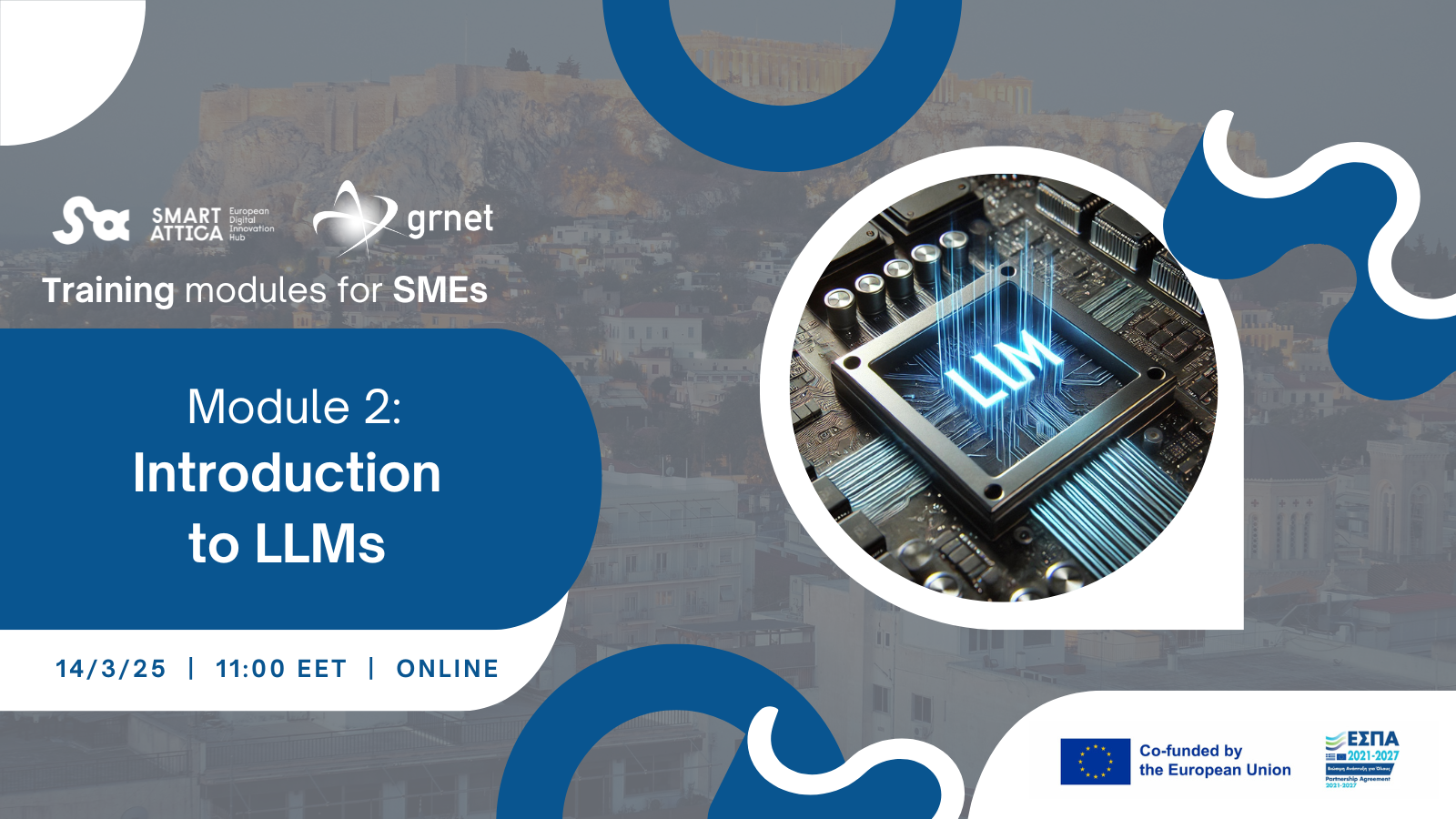

GRNET announced, in the context of SmartAttica EDIH (European Digital Innovation Hub), the 2nd Module of Τraining modules for SMEs with the subject "Introduction to Large Language Models", that took place online on March 14th, 2025.
Date: March 14th, 2025, at 11:00 EET
Location: Online via Zoom
Presentation Language: Greek
Instructor: Dr. Nikolaos Bakas (GRNET)
Description: This module provided a practical introduction to Large Language Models (LLMs) and their applications, focusing on setting up the necessary computational environment and using the Transformers library. Participants engaged in hands-on activities to download, configure, and utilize LLMs, including generating text and working with embeddings.
Target Audience:
SME professionals and tech enthusiasts interested in understanding and applying large language models in business or technological solutions.
Learning Objectives:
- Understand the fundamental concepts and applications of LLMs.
- Set up and configure computational environments for LLM workflows.
- Install and use the Transformers library for NLP tasks.
- Download and configure language models for various applications.
- Generate and interpret text outputs using language models.
- Utilize embeddings for tasks like similarity measurement and retrieval-augmented generation.
- Gain practical experience through interactive exercises and problem-solving.
Prerequisites:
- Basic programming knowledge
- Familiarity with Python
- Basic understanding of machine learning concepts.
Note: Please enter your institutional/corporate email when registering.
Indicative Contents
- Introduction to Large Language Models
- A brief overview of LLMs and their applications.
- Introduction to the seminar structure and objectives.
- Setting Up the Environment
- Instructions on setting environment variables and necessary tools.
- A quick walkthrough on using Colab and accessing GPU resources.
- HPC Environment Preparation
- Detailed guide on installing dependencies for High-Performance Computing (HPC) environments.
- Steps for resource allocation on HPC nodes.
- Introduction to the Transformers Library
- Explanation of the Transformers library and its components.
- Installation of necessary Python packages (transformers, accelerate, etc.).
- Downloading and Loading Models
- Instructions for downloading models from Hugging Face.
- Code demonstration for loading a language model like LLaMa-3.2-1B-Instruct.
- Tokenization and Model Configuration
- Setting up the tokenizer and handling special tokens like pad_token.
- Configuration of the model for causal language modeling tasks.
- Interactive Text Generation
- Hands-on example of generating text using the model.
- Explanation of parameters like max_new_tokens and streaming text outputs.
- Understanding and Utilizing Embeddings
- Import sentence-transformers and compute embeddings for words/sentences.
- Visualizing and interpreting similarity matrices with cosine similarity.
- Retrieval-Augmented Generation (RAG)
- Overview of RAG and its importance in enhancing model outputs.
- Demonstration of extracting relevant information using embedding-based retrieval.
- Interactive Q&A and Hands-On Practice
- Addressing participant questions.
- Encouraging participants to try modifying the code and parameter settings for deeper understanding.
The project is co-funded by the European Union. Views and opinions expressed are however those of the author(s) only and do not necessarily reflect those of the European Union or the European Commission. Neither the European Union nor the granting authority can be held responsible for them.
